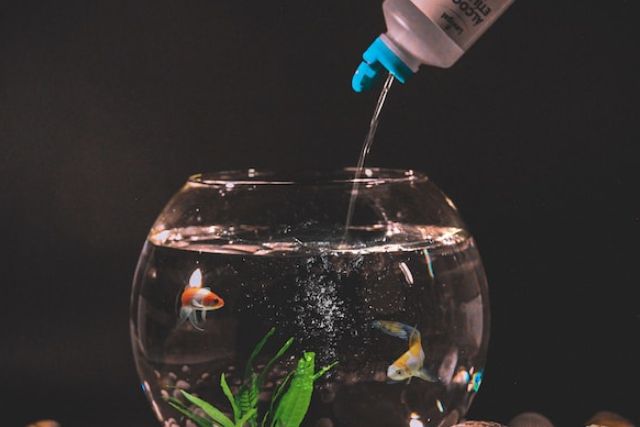Table of Contents
If you’re a fish owner, you know that providing your fish with clean, fresh water is essential for their health and well-being. While tap water can be treated with various chemicals and additives that can be harmful to fish, many people wonder if bottled water is a safe alternative. Can you put bottled water in a fish tank?
The short answer is yes, you can use bottled water in a fish tank. However, it’s important to understand that not all bottled water is created equal.
Some brands of bottled water may contain minerals or chemicals that can be harmful to fish, while others may lack essential minerals that fish need to thrive.
Additionally, bottled water can be more expensive than tap water, and it may not be the most environmentally friendly option.
Water Quality and Fish Health
The Importance of Water Quality
As a fish owner, you must always prioritize the quality of water in your fish tank. Water quality is essential for the health and well-being of your fish. Poor water quality can lead to stress, disease, and even death.
Fish depend on water to breathe, obtain nutrients, and eliminate waste. Therefore, it is crucial to ensure that the water in your fish tank is clean, clear, and free from harmful contaminants.
How Bottled Water Affects Water Quality
Bottled water is not recommended for use in fish tanks. Bottled water is often treated with chemicals such as chlorine, which can be harmful to fish.
Additionally, bottled water is not regulated for use in fish tanks, so there is no guarantee of its quality. The lack of minerals in bottled water can also affect the pH balance of your fish tank, making it difficult for fish to survive.
If you must use bottled water in your fish tank, make sure to read the label carefully. Look for bottled water that is labeled as “purified” or “distilled” and does not contain any added minerals or chemicals.
However, it is still recommended to use tap water that has been treated with a dechlorinator and allowed to sit for 24 hours to ensure that any harmful chemicals have evaporated.
The Effects of Poor Water Quality on Fish Health
Poor water quality can have a significant impact on the health of your fish. Fish that are exposed to poor water quality may experience stress, which can lead to weakened immune systems and an increased risk of disease. Additionally, poor water quality can cause physical damage to your fish, such as fin rot or skin lesions.
Fish that are exposed to high levels of ammonia or nitrite in the water may experience respiratory distress, which can lead to death.
Poor water quality can also cause fish to become lethargic and lose their appetite, leading to malnutrition and further health problems.
In conclusion, the quality of water in your fish tank is vital to the health and well-being of your fish. Avoid using bottled water in your fish tank, as it may contain harmful chemicals and lack essential minerals.
Ensure that the water in your fish tank is clean, clear, and free from harmful contaminants to keep your fish healthy and happy.
Bottled Water vs. Tap Water
When it comes to filling your fish tank, you may be wondering whether to use bottled water or tap water. Both options have their pros and cons, and it’s important to understand the differences between them before making a decision.
Differences Between Bottled Water and Tap Water
Bottled water is often marketed as a purer and safer alternative to tap water. However, this is not always the case.
In fact, bottled water is often just tap water that has been filtered and bottled. This means that it may contain the same minerals and chemicals as tap water, depending on the source.
On the other hand, tap water is treated with chemicals such as chlorine to kill bacteria and other harmful microorganisms.
While this may sound concerning, it’s important to note that these chemicals are typically present in safe levels and are not harmful to fish.
Is Tap Water Safe for Fish?
In most cases, tap water is safe for fish. However, it’s important to note that tap water quality can vary depending on your location.
For example, some areas may have higher levels of chlorine or other chemicals in their tap water. It’s always a good idea to test your tap water before using it in your fish tank.
If you’re concerned about the quality of your tap water, you can use a water conditioner to remove any harmful chemicals and make it safe for your fish. Water conditioners are readily available at most pet stores and are easy to use.
Can You Use Bottled Water in Place of Tap Water?
While it’s possible to use bottled water in your fish tank, it’s not always the best option. Bottled water can be expensive, and it may not be as pure as you think.
Additionally, some bottled water may not contain the necessary minerals and nutrients that your fish need to thrive.
If you do decide to use bottled water, make sure to choose a brand that is specifically labeled as safe for fish. You should also test the water for pH and other important parameters before adding it to your tank.
In conclusion, both tap water and bottled water can be used in your fish tank. However, it’s important to understand the differences between them and choose the option that is best for your particular situation.
Testing your water regularly and using a water conditioner can help ensure that your fish stay healthy and happy.
Considerations for Using Bottled Water
When it comes to using bottled water in your fish tank, there are a few important considerations to keep in mind.
In this section, we’ll cover the types of bottled water available, how to choose the right bottled water for your fish tank, and cost considerations.
Types of Bottled Water
There are several types of bottled water available, including spring water, purified water, and distilled water. Spring water comes from natural springs and contains minerals that can be beneficial for your fish.
Purified water goes through a filtration process to remove impurities, while distilled water is boiled and then condensed to remove impurities.
Choosing the Right Bottled Water for Your Fish Tank
When choosing bottled water for your fish tank, it’s important to consider the needs of your fish. Some fish require a certain pH level or specific minerals in their water, so it’s important to choose a bottled water that meets those needs.
You can check the pH level and mineral content of bottled water by reading the label or contacting the manufacturer.
It’s also important to choose a bottled water that does not contain any additives or chemicals that could harm your fish. Look for bottled water that is labeled as “natural” or “pure” and does not contain any added flavors or colors.
Cost Considerations
Using bottled water in your fish tank can be more expensive than using tap water. However, if your tap water contains high levels of chlorine or other chemicals, using bottled water may be necessary to ensure the health of your fish.
When considering the cost of using bottled water, it’s important to factor in the size of your fish tank and how often you need to change the water. You may be able to save money by purchasing larger bottles of water or by buying in bulk.
Overall, using bottled water in your fish tank can be a good option if your tap water is not suitable for your fish.
By choosing the right type of bottled water and considering cost factors, you can ensure the health and well-being of your fish.
Conclusion
In conclusion, it is not recommended to put bottled water in a fish tank. While bottled water may seem like a convenient option, it lacks the necessary minerals and nutrients that fish need to thrive. Additionally, bottled water may contain chemicals and additives that can harm your fish.
It is important to note that tap water can also pose a risk to your fish if it is not properly treated. Chlorine and other chemicals in tap water can be harmful to fish, so it is important to use a water conditioner to neutralize these chemicals before adding tap water to your tank.
The best option for your fish is to use a high-quality aquarium water conditioner that is specifically designed for use in fish tanks.
These products are formulated to remove harmful chemicals and provide essential minerals and nutrients that fish need to thrive.
When selecting a water conditioner, be sure to read the label carefully and choose a product that is safe for your particular type of fish.
Some water conditioners may be harmful to certain types of fish or may not be effective in removing certain chemicals.
Overall, the key to keeping your fish healthy and happy is to provide them with clean, healthy water that is free from harmful chemicals and additives.
By using a high-quality water conditioner and avoiding bottled water, you can ensure that your fish have the best possible environment to thrive in.







